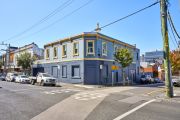
QIC’s big plan to fix the nation’s housing and healthcare shortages
Queensland’s sovereign wealth fund has turned its attention to the country’s housing and healthcare shortages, where it believes there are strong returns for those that can deliver much-needed homes and hospitals.
It is a shift in strategy led by Deborah Coakley, who has just taken charge of Queensland Investment Corporation’s $14.5 billion real estate platform.
QIC has traditionally focused its investment effort on shopping malls, such as north-west Sydney’s mammoth Castle Towers. But that’s changing quickly, an ambition that is further spurred by the challenges to the commercial property sector as it battled falling valuations and high interest rates following the COVID-19 pandemic.

Steering that revised strategy is Ms Coakley, the former Dexus real estate funds management chief executive who jumped ship to head QIC’s real estate platform four months ago.
QIC’s property pivot was formed as a response to the supply constraints that have hit the Australian economy as population growth outpaced the construction effort.
“The federal government is telling us that there is a residential crisis. The demand is there. But what are we doing on the supply side? That is the piece that QIC is trying to solve to make those projects investable,” Ms Coakley told The Australian Financial Review.
“As a result, what we would like to be doing is ensuring we have the right capabilities across broader asset classes than just retail. We need to build out further capabilities in healthcare and residential.”
QIC began building a suite of affordable living spaces for a mandate from Brisbane Housing and the Queensland government last month, the first among a slew of affordable housing projects it will build.
The state sovereign wealth fund plans to create even more homes by partnering with major builders and cash-rich funds to build on the near-1 million square metres of developable land it owns, to address those supply constraints. Most of that land sits on the eastern seaboard.
Ms Coakley will be making that pitch at an Asian roadshow next week as part of a broader QIC delegation that includes chairman Geoff Brunsdon and chief executive Kylie Rampa, in search of capital partners and investors.
Born to an investment banker father and accountant mother, real estate was not Ms Coakley’s first career in corporate Australia. At university, she worked full-time in investor relations while also studying full-time, before becoming a partner at Deloitte and then taking a senior human resources role at Qantas.
After those roles, she spent 11 years at Dexus where she moved up the ranks to lead the listed property giant’s funds management team. Industry insiders say Ms Coakley’s varied and deep credentials have made her a safe pair of hands for QIC Real Estate.
She moved to QIC after missing out on Dexus’ chief executive role, having been one of the top internal candidates to replace Darren Steinberg. The company appointed its chief investment officer Ross Du Vernet to the top job.
Rebalancing the books
Since joining QIC, Ms Coakley has been working quickly to clean up the sovereign wealth fund’s balance sheet, acknowledging that its retail portfolio had underperformed.

Part of that strategy, which was in train before she began her tenure, has been to divest major shopping centres to meet redemption requests and pay down debt.
Among the divestments have been western Sydney’s Westpoint Shopping Centre which sold for a record $900 million and its half-stake in Perth’s Claremont Quarter for $207 million. QIC is also in discussions to sell western Melbourne’s Woodgrove Mall in the hopes of getting back about $450 million.
Those assets were and are held by the QIC Property Fund and QIC Town Centre Fund.
According to the MSCI/Mercer Australia Core Wholesale Monthly Property Fund Index, which covers major wholesale property funds, the QIC Town Centre Fund has provided the worst returns among retail-only funds, with just 1.3 per cent over a 10-year period. The average 10-year net return among those retail funds was 2.8 per cent annually.
Early signs of a turnaround are emerging for the QIC Town Centre Fund, which posted a positive net return of 2.7 per cent in the latest quarter and was the best performance among retail-only funds.
“The divestments have been less about, frankly, the assets themselves, but more about what’s happening in funds management which is not exclusive to QIC,” Ms Coakley said.
“There have been redemption requests made across almost all fund managers around Australia and the globe. So most of the asset sales have been triggered as a result of liquidity requirements within the funds. They’re great assets, and had we not had these liquidity requirements, we would actually have loved to have kept those assets.”
With the rationale for the divestment being to meet liquidity requirements, Ms Coakley said the sale proceeds have not created a war chest to acquire more shopping centres. But the proceeds have provided enough liquidity to allow QIC to manage the remainder of its malls in a way that is “adding to the performance”.
Ms Coakley added that QIC’s other funds were actively looking for acquisition opportunities.
“Is this a good market to be looking at the acquisition of some assets? I think it is not necessarily for those particular funds, but for other investors and other mandates and strategies we have, we will be actively looking in the market.”










